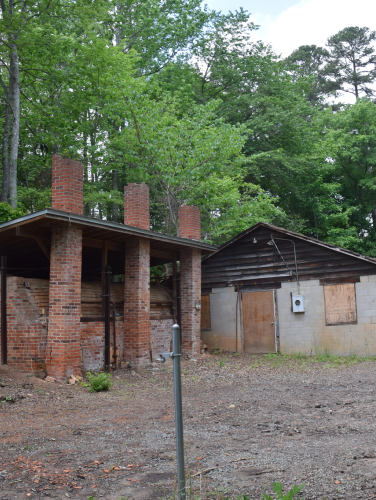
Outen Pottery
(ca. 1952)
The workshop and pottery kiln of noted potter Ralph F. Outen is the last remnant of a pottery industry that thrived in Matthews for much of the 20th century.
430 Jefferson St, Matthews, NC 28105
The R. F. Outen Pottery is a rare surviving example of a Mecklenburg County workshop and pottery kiln that produced utilitarian earthenware and stoneware from local clays for local use. Once common throughout the Piedmont of North Carolina in the nineteenth century, the pottery industry nearly disappeared as the twentieth century progressed, even in Matthews which was once a significant producer of pottery. Consisting of a one-story workshop with shed additions and a detached brick kiln, the R. F. Outen Pottery is associated with Rufus Franklin Outen (1905-1983), one of North Carolina’s last traditionally trained potters who continued to produce utilitarian folk pottery in the second half of the twentieth century.
Property Quick Links
Rufus Outen learned the traditional pottery trade from his father William F. Outen (1871-1947) and his uncle James "Jug Jim" Broom (1869-1957). William and James worked together as potters in Monroe, North Carolina, until 1900. James continued to operate a shop in Monroe until 1946 and was the last traditional potter in Union County. Meanwhile, William moved to South Carolina in the early 1900s to establish potteries in Sumter, Lancaster, Catawba Junction, and Cheraw before finally settling in Matthews in 1922 where he established Matthews Pottery. Rufus likely worked in his father's potteries from an early age and certainly labored in the Matthews Pottery. He moved to Marion, Virginia, in 1929 to work in a pottery there, but the onset of the Great Depression soon forced him to return to the Matthews Pottery.
Rufus continued throwing pots in the traditional manner at the Matthews Pottery until he opened R. F. Outen Pottery circa 1952. He built his shop and kiln on the edge of Matthews, next door to a home he constructed in 1947. Construction and perfection of the kiln involved years of trial-and-error experimentation. Controlling for the kiln’s six original chimneys and the feeds of fuel oil and forced air, the burners, air and fuel flow, and exhaust draft all had to be modified until the kiln functioned optimally. Rufus’ oil-burning rectangular downdraft kiln was itself a distinctive kiln design utilized by mid-twentieth century North Carolina potters.
Rufus employed one or two part-time helpers, but he did most of the production work, sales, and marketing himself. His wife Louise and their four children helped out, digging and prepping clay, making deliveries, and occasionally creating decorative items. Among the products Rufus hand-produced were stoneware churns, pitchers, and rabbit watering bowls. Rufus also taught pottery at Winthrop College in Rock Hill, South Carolina, for a short time. The R. F. Outen Pottery operated until Rufus retired in 1976. With his retirement and the closure of Matthews Pottery that same year, pottery production in Matthews ceased. Rufus continued to produce and sell pottery clay for such clients as the art departments of Charlotte and Mecklenburg County schools until his death. The R. F. Outen Pottery became the last visible remnant of the Matthews pottery industry when the original kiln of Matthews Pottery was demolished in connection with the expansion of State Highway 51.

